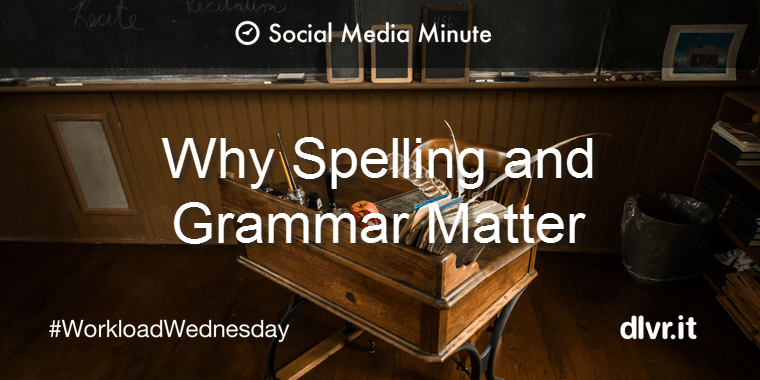
5 Absolute “Must-do’s” Before You Hit Publish on your Social Media Post
(#WorkloadWednesday) While I was growing up, my Mom was a primary grade school teacher and my Dad, Superintendent of Schools. No day went by without one of my parents correcting my spoken grammar or checking my homework for spelling and grammatical errors. These were the typewriter days – the era prior to computers. Spell check was the Oxford Dictionary, on my bookshelf. Next to it, was Merriam-Webster’s Guide to Punctuation and Style. Today, I find myself performing the same role for my kids as my parents did for me. Thankfully, the tools and online resources available now, such as Grammarly, far surpass my old school resources, excluding my parents, of course. In addition to these resources, it is always helpful to have a literate second set of eyes. In my case, when up against a deadline, this job falls to my well-educated husband who has become my social media post grammar and spelling editor.
Why Spelling and Grammar Matter in Social Media Marketing
Accurately drafted materials are an indispensable part of your strong social media marketing presence. Every blog post, web page, marketing offer, newsletter, support FAQ and social media update gives your audience an insight into you, as the author, and the company you represent. Publishing well-written, persuasive, and trustworthy content helps solidify your credibility.
In an article published on HubSpot, an entrepreneur who runs websites in the UK discussed how spelling errors accounted for millions of pounds worth of lost revenue.
Misspellings “put off customers who could have concerns about a website’s credibility”. He said this is clearly apparent when revenue per visitor was twice as high after an error was fixed on the website tightsplease.co.uk.
Readers do not only notice spelling errors; they also will, both consciously and unconsciously, see grammatical ones. There are instances when writing that is stylistically engaging, persuasive and fun but not perfectly towing the grammatical line is sometimes preferable. However, even in situations where a lighter stylistic approach is called for, making glaring grammatical errors will have you appear careless or uneducated and may harm your business.
So What Should You Do to Avoid These Errors?
1. Read Aloud To Edit Your Work. Reading out loud is always my first technique for checking my work. You may look a little strange if you’re caught talking to yourself, but reading your work aloud forces you to slow down, to hear rhythms, and to notice repetition.
2. Spell check. There’s more to checking spelling than running the spell check within programs such as Word. Make sure the words you have, are the words you want. Don’t confuse ‘their’ and ‘they’re’ or ‘it’s’ and ‘its.’ Most work can stand one or two (or even more) reviews. Our post on How to Prevent Blog Post Blunders and Other Grammar Pet Peeves provides great tips on copy editing on a budget.
3. Have someone else read your work. By the time you’ve finished writing, you’re not likely to see all of your mistakes. This is where my writing partner steps in or in some cases, my husband. Missing words, sentence fragments, and other errors may appear corrected in your head, but not in someone else’s. A fresh set of eyes can find these unfound errors for you. If you don’t have a second person available to edit your post, or if you are on a budget, here is what I suggest:
- Step away from your article and review it later when you can give it a fresh look
- Follow step # 2, above, by dropping your copy into Microsoft Word to use as your editor
- Splurge on Grammarly.com as an online editing tool
4. Be gracious and thankful when someone points out an error on your site, and FIX IT IMMEDIATELY. There is no “I’ll get to that in a minute” when talking about an error on your website. As mentioned, mistakes could be costly.
5. Before you hit “publish” or “send”, review CyberAlert’s list of 15 Commonly Misused Words. Better yet, print out a copy to keep as a handy reference for your upcoming social media posts.
Misused words are literally the worst way to get your readers attention. If that sentence seems fine to you, then you should review the following words on this list.
| 15 Commonly Misused Words | |
| Ultimate | When used as an adjective, “ultimate” describes something that happens at the end of a process. However, the term is frequently used to indicate the “best” of something. |
| Ironic | We may have Alanis Morissette to thank for the vast misuse of “ironic.” While Morissette and others tend to use “ironic” to describe funny coincidences or events, the word describes a situation that that differs from our expectation. |
| Few vs. Less |
Though many use the words interchangeably, “few” should be used to compare quantities, while “less” should be used to compare something that can’t be counted. Example: “less money” vs. “fewer coins” |
| Discreet vs. Discrete |
Discreet means modest or careful, discrete means separate or distinct. |
| Farther vs. Further |
This is a slight distinction, but important to remember: “farther” is used for physical distance while “further” is used figuratively. Example: “California is farther than Michigan.” vs. “He wanted to further his career in science.” |
| Would Have/Could Have |
If you ever use “would of” or “could of,” the recipient of your message will seriously doubt your credibility. |
| Most vs. Almost |
If you ever use “would of” or “could of,” the recipient of your message will seriously doubt your credibility. |
| All Right |
It is not “all right” to describe something as “alright”. |
| E.G. vs. I.E. |
The abbreviation “e.g.” means “for example,” while “i.e.” means “in other words”. |
| Enormity |
People often situate “enormity” with size, but it actually means “extreme evil”. |
| Affect vs. Effect |
“Affect” is a verb, “effect” is a noun. “Effect” can be used as a verb, but has a different meaning: to cause something to happen. Example: “Nature has always effected a cure.” |
| Based On |
The phrase is often replaced with “based off,” which is incorrect. A “base” is the lowest part of something, so when you “base an argument on evidence,” your argument is built on evidence. |
| A Part of | When written as “apart of,” the meaning is quite the opposite. “Apart” describes separated, “a part” describes a piece of something. |
| Alternately vs. Alternatively | “Alternately” means one after the other, while “alternatively” means one or the other. Example: “She would alternately speed up and slow down while driving.” vs. “We could take the train or alternatively drive the car.” |
| Complement vs. Compliment |
Use “complement” to describe something that completes or augments something else. Use “compliment” as a noun or verb to express admiration. |
If you’re the visual sort, here’s an infographic just for you. Copyblogger assembled the 15 most egregious grammar goofs into one helpful infographic. Print out this handy reference, and you’ll never look silly again on social media:

What words or phrases do you see commonly misused in social media posts? Share them in the comments below.
Feature photo by Todd Petrle



